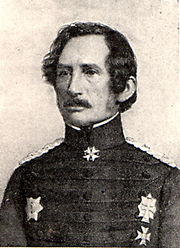
Christian Julius De Meza
Encyclopedia

Denmark
Denmark is a Scandinavian country in Northern Europe. The countries of Denmark and Greenland, as well as the Faroe Islands, constitute the Kingdom of Denmark . It is the southernmost of the Nordic countries, southwest of Sweden and south of Norway, and bordered to the south by Germany. Denmark...
army during the 1864 Second Schleswig War
Second War of Schleswig
The Second Schleswig War was the second military conflict as a result of the Schleswig-Holstein Question. It began on 1 February 1864, when Prussian forces crossed the border into Schleswig.Denmark fought Prussia and Austria...
. De Meza was responsible for the withdrawal of the Danish army from the Danevirke
Danevirke
The Danevirke The Danevirke The Danevirke (modern Danish spelling: Dannevirke; in Old Norse Danavirki ; in German Danewerk ; is a system of Danish fortifications in Schleswig-Holstein (Northern Germany). This important linear defensive earthwork was constructed across the neck of the Cimbrian...
, an event which shocked the Danish public and resulted in the loss of his command.
Of Sephardic
Sephardi Jews
Sephardi Jews is a general term referring to the descendants of the Jews who lived in the Iberian Peninsula before their expulsion in the Spanish Inquisition. It can also refer to those who use a Sephardic style of liturgy or would otherwise define themselves in terms of the Jewish customs and...
extraction, De Meza served honorably in the First War of Schleswig
First War of Schleswig
The First Schleswig War or Three Years' War was the first round of military conflict in southern Denmark and northern Germany rooted in the Schleswig-Holstein Question, contesting the issue of who should control the Duchies of Schleswig and Holstein. The war, which lasted from 1848–1851,...
and played an important role in securing the Danish victory in the 1850 Battle of Isted
Battle of Isted
The Battle of Isted took place on July 25, 1850, near the village of Idstedt, today Schleswig-Holstein, Germany. The battle was part of the First Schleswig War....
—at its time, the largest battle in Scandinavian history.
In 1864, De Meza was appointed supreme commander of the Danish forces. His objective: to defend the Danish border against a much greater combined Prusso
Prussia
Prussia was a German kingdom and historic state originating out of the Duchy of Prussia and the Margraviate of Brandenburg. For centuries, the House of Hohenzollern ruled Prussia, successfully expanding its size by way of an unusually well-organized and effective army. Prussia shaped the history...
-Austrian
Austrian Empire
The Austrian Empire was a modern era successor empire, which was centered on what is today's Austria and which officially lasted from 1804 to 1867. It was followed by the Empire of Austria-Hungary, whose proclamation was a diplomatic move that elevated Hungary's status within the Austrian Empire...
army. But at the age of 72, De Meza was well past his prime and his task became even more difficult due to the conflict erupting during the winter season.
De Meza estimated that his men were facing certain defeat and a pointless loss of life, and on the evening of February 5, 1864 telegraphed the War Ministry stating that the army since the day before had been preparing to withdraw to the position at Dybbøl
Dybbøl
Dybbøl is a small town, with a population of 2,457 in the southeastern corner of South Jutland, Denmark. It is located around west of Sønderborg....
. He subsequently closed down the telegraph line to prevent his order being overruled.
The withdrawal resulted in an outraged cabinet promptly relieving De Meza of his command on February 7 even though the army was in the rather critical process of organising the defences at Dybbøl. De Meza was officially dismissed on February 28 and even though he did resume the position as general on August 5, he did not participate directly in the war again. In retrospect, the withdrawal was carried out with great skill and although parts of the artillery's guns were left behind, the Danish army did arrive almost undamaged to the new position. Historians have argued that if the army had not been withdrawn, the Dannevirke position would have been overrun, and even the commission appointed by the cabinet to investigate and document the reasons for abandoning Dannevirke acquitted de Meza completely in its report of March 10, 1864 and blamed the War Ministry for lack of preparation and negligence. He died several months after the war ended.

